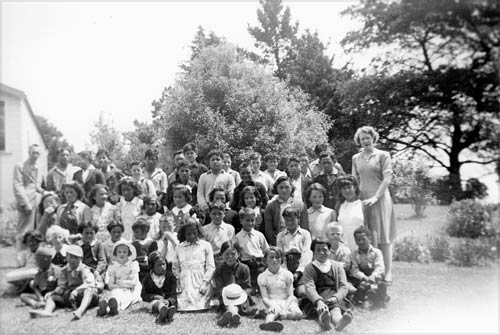
Tokorangi School in Manawatū was one of the country schools that Celia Geary attended. Her father, Len Browning, was a teacher in various country schools – he is standing in the left background of this photograph.
What\'s you story?
Contributed by Celia Geary
I was born in 1936, and, as my father was a teacher in a two-teacher school in the back country of Hawke’s Bay, I had only a short distance to go to school. I envied the children who rode horses and would beg for a ride on their ponies on the way home. I would ride and they would walk until they got tired. Then they would carry on home and I would walk back to my house. Most of the ponies in those days were Shetland ponies and they were tricky little things to ride, but I never fell off. More luck than good management I think.
One of the children walking to school would collect our milk billy from a farm on the way and return it empty in the afternoon. At weekends and holidays it was my job to go for the milk each day, and I really enjoyed walking in bare feet through the grass at the side of the road, rain or sun. On cold days it was great to get the tingle of returning warmth in my half frozen feet. It was wartime and our billy was a large golden syrup tin.
Some children would arrive at school at 7.30 in the morning and come into our house so that they could read the Auckland Weekly News as there were no books in their houses. A line of children sitting on our painted wooden floor with toes turned to the wood stove, reading books, would be quiet for an hour until they were allowed into the school grounds. These were tough kids who could swear for several seconds without repeating themselves. All their fathers worked on large farms in the area and they had at least two miles to walk. They got up when their fathers got up, chopped kindling, lit fires, made breakfasts and then walked to school, and some were only six or seven years old.
Some of these children could throw a ball so hard and so accurately that the ball would get stuck in the netting fence at the side of the playground. We played rounders, longball, marbles, ‘boys against girls’ (which was played with a large ball, a bit like basketball but we had no hoops), cowboys and Indians, cops and robbers, and rugby. In all these games boys and girls, big kids and little ones, all played together. The only injury I remember was when one little boy got too close to a big girl swinging the bat for rounders and had his forehead split open. We used to get stingers on our legs from the big boys when we were playing longball, but we never complained. It was just part of the game. Every summer we walked two miles there and back to the nearest little river and spent all afternoon twice a week swimming.
One country school I went to had a large vegetable garden worked in by the children. Every day the senior girls would gather vegetables and make soup. One day they put beetroot in the soup and many were reluctant to have their cup of soup that day as it looked ‘funny’. This cup of soup was sometimes all that the children would have for their lunch. Because it was wartime, Granny Smith apples in season were supplied free by the government, as it was difficult to export them.
When I had to go to secondary school, we moved to an area where there was a bus service, so that was the end of my real country school experiences.
Using this item
Private collection
This item has been provided for private study purposes (such as school projects, family and local history research) and any published reproduction (print or electronic) may infringe copyright law. It is the responsibility of the user of any material to obtain clearance from the copyright holder.




















Add new comment